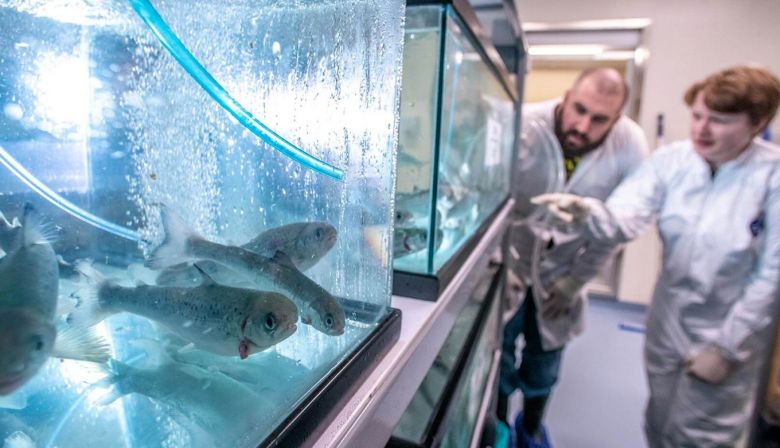The Sustainable Aquaculture Systems Supporting Atlantic Salmon project, also known as SAS2, brings together several academic and federal research institutions and nine industry partners from the U.S, Iceland and Norway as part of a National Institute of Food and Agriculture (NIFA) program, which provides funding to advance sustainability in agricultural sciences. SAS2 builds on the Sea Grant funded RAS-N Network, a three-year project designed to network stakeholders and develop a strategic road map for Atlantic Salmon RAS in the U.S. UMaine plays a leadership role in both projects.
Recirculating Aquaculture Systems (RAS) are an emerging technology with a substantial potential to expand production and add resilience to domestic finfish aquaculture. These land-based culture systems decrease reliance of finfish production on coastal ecosystems and reduce vulnerability to environmental conditions. RAS also allows optimized site selection based on important parameters such as proximity to markets, affordable land, water availability and other market factors.
Managed effectively, domestic RAS operations could reduce the seafood trade deficit and address increased market demand.
The long-term goal of SAS2 is to support a sustainable U.S. Atlantic salmon RAS industry that expands the domestic production of finfish with decreased environmental impacts, increased waste capture, enhanced biosecurity, improved control of pathogens, and better disease mitigation. SAS2 integrates research, education and extension to address the major challenges and roadblocks to RAS as defined by industry partners and community stakeholders.
Affiliated ARI faculty in engineering and marine sciences will concentrate on techno-economic modeling, water quality monitoring and brood stock management. ARI in collaboration with UMaine’s Cooperative Extension 4-H, Wabanaki Youth in Science Program (WaYS), and Center for Cooperative Aquaculture Research (CCAR) will lead the educational objectives of the project and ARI working with Maine Sea Grant will advance the Extension objectives.
“The Aquaculture Research Institute is eager to expand upon the work of the RAS-N network,” says ARI director Deborah Bouchard. “ARI will lead the RAS finfish health program as well as the workforce development and community outreach efforts for the project. This new funding is key to helping prioritize sustainability and the inclusive values that are important to advancing equitable rural development in Maine.”
Contact: Deborah Bouchard, deborah.bouchard@maine.edu
